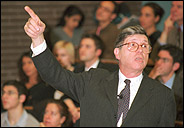Exploding the genome miracle
When scientists of the last century discovered DNA, they called it a biological "Holy Grail." According to Dr. Richard Lewontin, they were wrong, though this perception has coloured our ideas about genetic research ever since.
 Dr Richard Lewontin
Dr Richard LewontinPHOTO: Owen Egan |
|
"According to legend, the Grail was self-renewing and provided total sustenance," said Lewontin, who maintains that despite claims to the contrary, genes can't do either. Lewontin spoke to a packed Palmer Howard lecture theatre on November 8 to deliver the 24th annual Osler lecture, sponsored by the Department of Social Studies and Medicine and the Osler Society.
The prominent evolutionary geneticist, author and Harvard professor used his talk to attack scientific and media claims that our genes hold the key to solving all of our medical problems. Entitled "Genomania," his talk dispelled many myths that society has about medical progress in general, and genetics in particular.
"I had considered calling this lecture 'Promises, Promises,'" said Lewontin. "Every week there appear ... reports of genes that have been discovered for this, that or the other thing. The rhetoric of these claims is always in the conditional mode."
To illustrate his point, Lewontin pointed to a number of articles culled from newspapers from around the world. Each trumpeted the discovery of a gene that was purported to be tied to a specific disorder. As Lewontin delighted in pointing out, each of these reports was riddled with phrases such as "could lead to a treatment," or "may have an effect."
"The question for us is how often are these promises made good," he said. According to him, so far there have been almost no signs that genetics will be able to cure any diseases or disorders. Despite this, one prominent American genetics researcher recently felt confident enough to claim that "death is nothing more than a series of preventable disorders."
The reason for the difference between the claims and the reality, said Lewontin, is due to our misconceptions both of the importance of our genes to our development, and of the science that studies them. As an example, he pointed to an article that claimed "Most of World's Illness Due to Faulty Proteins."
"What they're saying is that faulty genes are the cause of most of the world's sicknesses, and that is simply not true," he said. "Most of the world's sicknesses come from proteins that are working extremely well, as in parasites, or from a lack of protein. A very large portion of the world's sicknesses comes from hunger."
Contrary to popular belief, the big killers of a century ago, such as tuberculosis and measles, were not eliminated by vaccines. Rather they were eliminated by rising standards of living and better nutrition.
Pointing to one graph that showed the declining infection rate in Britain in the 20th century, Lewontin said, "Immunization for measles began after no one was dying of measles."
Lewontin argued that medical progress is actually less important than we have been led to believe. Life expectancy has not increased substantially over the last few decades, and there are no guarantees that genetics holds the key to improving it.
Though Lewontin believes that genetic treatments may hold some promise -- "Anyone who says that gene therapy will never cure anything is a fool." -- he questions the philosophy that lies behind much of the research.
"The deeper belief is that the gene is the cause of the organism," he said. "Organisms do not compute themselves from their DNA. If DNA were a computer you'd send it back; every time you turn it on you get a different result."
Individual cells in every organism differ enough from each other that no two will process DNA information in exactly the same way, making many genetic therapies impractical. Lewontin alleges that the reason that so many researchers are investing so much time and energy into genetics anyway is simply because they can.
"The problematic follows the technique. If any fool can sequence DNA, then any fool will," he said.

